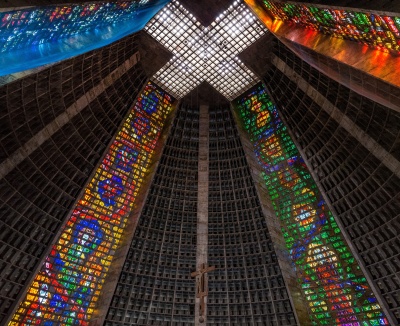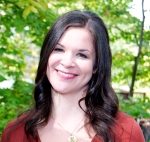
The United Methodist Church (UMC) General Conference, the denomination’s legislative body that meets every four years, is currently underway in Portland, Oregon. For self-avowed “MethoNerds” this is a highly anticipated event akin to watching the Olympics. Meanwhile I’m doing my best to keep my distance from the happenings there.
For six years I worked in the public policy and advocacy office of the UMC, the church into which I had been baptized as a teenager. My position was one coveted by many and for good reason. I got to write, speak, and travel the country, connecting with congregations and training people of faith in advocacy for women and girls. But I was also required to witness the political infighting of General Conference in 2012, which left me in tears and with little hope for a more just, compassionate church.
After that experience my work in the church began to lose its luster. The daily grind of halfheartedly upholding an institution that didn’t align with my theological values, especially around LGBTQ inclusion and abortion care, took its toll. And my life circumstances changed dramatically: I moved from DC to North Carolina, got married, and had my daughter (without any paid time off, which is another matter needing attention.) As a breastfeeding mom of a newborn, many of the aspects of the work that once appealed to me—constant travel, trainings, speaking engagements—were now logistical nightmares. I decided it was time to move on.
Now that I’m no longer officially part of the church bureaucracy, discerning my relationship with the denomination has been a real struggle. Having peeked behind the curtains of the institution’s top leadership I’ve witnessed more than my fair share of the vicious political jockeying and childish territoriality that makes the U.S. Congress look cooperative and congenial by comparison. Feeling jaded and pessimistic about the future of the church, I decided to try reconnecting with a local congregation in the hopes that I might recover some of the faith I’d lost in the institution over the last few years.
As I work mightily to create a comfortable bubble in which I can heal from the wounds of that time, there are forces at work bursting it. In recent months I’ve received more than a handful of calls and emails from fellow Methodists eager for my input on strategy around reproductive health and rights. In many ways I feel like I’m in that post-break-up stage when I try to mask my annoyance when well-meaning friends keep bringing up my ex: “Did you know what so-and-so is up to now?” Actually, no. I’m trying to move on from that time in my life. What I need is space.
Of course the UMC isn’t my ex-partner, and asking for distance from General Conference at a time when so much is at stake is unreasonable—and really unconscionable. The UMC is a monstrosity of an institution with policies and practices that have global implications. When the denomination’s harmful statements on sexual orientation and women’s health hurt my sisters and brothers, I can’t look away entirely. But what is my role supposed to be? How do I navigate the fact that I have my own denominational wounds that need healing? How much do I continue to sacrifice for an institution that turned on me during my time of great need?
Honestly I don’t know the future of my participation within the UMC. I’m still trying to redefine this messy relationship. So during this General Conference I’m doing my best to support those I love and advocate for justice on my own terms, but I also have to honor my need for separation. My stepping away creates a necessity for new advocates to step up and take charge. I just pray that they are ready and willing.
Katey Zeh, M.Div is a strategist, writer, and educator who inspires intentional communities to create a more just, compassionate world through building connection, sacred truth telling, and striving for the common good. She has written for outlets including Huffington Post, Sojourners, Religion Dispatches, Response magazine, the Good Mother Project, the Journal for Feminist Studies in Religion, and the United Methodist News Service. Find her on Twitter at @kateyzeh or on her website www.kateyzeh.com.
communities to create a more just, compassionate world through building connection, sacred truth telling, and striving for the common good. She has written for outlets including Huffington Post, Sojourners, Religion Dispatches, Response magazine, the Good Mother Project, the Journal for Feminist Studies in Religion, and the United Methodist News Service. Find her on Twitter at @kateyzeh or on her website www.kateyzeh.com.


Katey, thanks for being so open about your struggles. Having had the feeling of “belonging,” it must be very painful to feel estranged.
I experienced class discrimination in the Protestant Church of my childhood, so I never had that feeling of belonging to begin with in relation to any Protestant denomination.
Later when I was a practicing Catholic, the worldwide campaign of the Church against birth control and abortion (and the harm it does) was one of the reasons I severed my ties.
LikeLike
Thank you, Katey. I can so relate to this. Institutional worship lost its luster for me for many of the same reasons you describe. For me, I saw who had the decision-making power (straight, white men) and who did not. It also began to feel as if my volunteer energy supported a corporation rather than a body of believers.
LikeLike
Thanks, Marie. I know what you mean about upholding a corporation–I really felt that toward the end of my time with the UMC when I realized that my own personal well-being meant very little. (I had a similar experience at divinity school.)
LikeLike
Yes, it is indeed painful, though no doubt less painful than never having felt accepted by the faith community at all. I’ve recently discovered a radically inclusive congregation in my nearby city, but as much as I want to join, I still feel pulled back to the denomination of my youth. I’m seeking the courage to sever my ties as you did with the Catholic church.
LikeLike
Katey, thank you for sharing your experience. I went through a similar reckoning in the Catholic Church as a member of Dignity during the AIDS crisis. It was so very painful at the time; however, it opened by eyes to the difference between spirituality and the institutional church. In retrospect, I wish everyone a similar awakening, regardless of the pain. Seeing the politics – mostly driven by men – ultimately made it easier to recognize and reject harmful dogma. It took a long time, but it thrust me forward on my spiritual development. Blessings to you and my Methodist friends at Iliff School of Theology during this difficult time.
LikeLike
Thank you, dedangelo. It’s helpful to hear others’ stories, but it’s also maddening to hear how many people of faith like you have been harmed by the church. I’m grateful that the Spirit continues to move, no matter if the institution remains or not. But it’s still painful. Thank you for your prayers.
LikeLike
There is nothing wrong with wanting a break from an institution, and in many ways it is better. If you do return, you can always come back to it with a fresh perspective.
I encourage you to find a completely different community to invest your time in (preferably one in which you can exercise your creativity, remember your rock motto!).
Even Moses had to take a break from his community for ten years (after he murdered that guy). I think he probably learned some important life lessons hanging out with the flocks in the countryside.
LikeLike
Your last paragraph gave me a much needed chuckle! (I have a dark sense of humor.) As I’ve shared with a few others I have found a new, radically inclusive faith community that feels like home. I’m grateful for it.
LikeLike
Thanks for sharing this Katey. Carol’s comment is a lot like my own experience beginning with a Presbyterian Church as a child, switching to Catholicism as an adult, and then so frustrated with the sexism in the Church, I had to discontinue the journey with Christianity. I finally moved on to Eastern spirituality in Zen and Taoism, and which I continue to embrace with love.
LikeLike
Sarah, I am so glad that you have found a spiritual “home” in Eastern spirituality. I’ve recently started attending a radically inclusive church near my home and feel it might be the place for our family. On my first Sunday I was lamenting my UMC heritage and the woman sitting next to me in the pew said, “Oh honey, I’m here and I’m Jewish!” I love the diversity there and the embrace of questioning.
LikeLike
Thanks for this post, Katey. And thank you for continuing to support women and LGBTQ folks in your denomination, despite your feelings of estrangement. It’s important work, and your former ties make you one of the people who can help.
LikeLike
I hope you are right, Nancy. I really do. Thank you.
LikeLike
Not good news for our friend Katey and other feminist United Methodists: http://www.christianitytoday.com/gleanings/2016/may/methodists-vote-themselves-out-of-pro-choice-group.html
LikeLike
And then there is this: http://www.christianitytoday.com/gleanings/2016/may/how-us-african-methodists-vote-homosexuality-umc-umcgc-2016.html
LikeLike